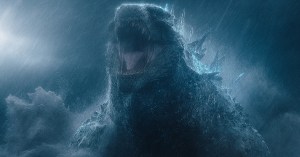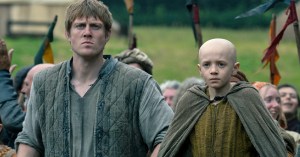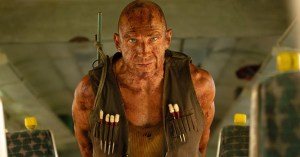The Get Down’s Justice Smith on the Finale and His Trip to Jurassic World
Also, rapping to the Rocky theme and voicing his comic book character.

New episodes of Netflix’s musical epic The Get Down premiered on April 7 — but they’re not, in fact, a new season. The five new installments of Baz Luhrmann’s pricey 1970s hip-hop origin tale are a continuation of the season that dropped last year. In the second half of season 1, the talented Bronx teens known as The Get Down Brothers find that success is complicated.
As for leading man Ezekiel (Justice Smith), the poet and rapper is applying to college and dealing with passive-aggressive racism from Yale’s affirmative action program. Zeke also has to deal with girlfriend Mylene’s (Herizen F. Guardiola) success as a pop star and what that means for their relationship.
Smith, who will next appear in the sequel to Jurassic World, spoke with Rotten Tomatoes about the conclusion of The Get Down’s first season, including filming his final scenes, rapping to the Rocky theme “Gonna Fly Now,” voicing his animated likeness in the show’s comic book sequences, and whether there will ever be a season 2.
Fred Topel for Rotten Tomatoes: What were the most challenging raps for you in part two of The Get Down?
Justice Smith: They were all pretty challenging, just because being a rapper in general is a very difficult thing for me to do. Luckily, I had the support of all these great tutors and coaches like Raheem and Grandmaster Flash and Kurtis Blow. They’re all rather difficult. Also, Nas writes the rhymes, so that’s kind of intimidating to perform his words.
RT: So how do you practice? Do you do it without the music first?
JS: Usually they’ll send me a sample track of Nas doing the rap, or Raheem doing the rap, and I try to imitate it as much as possible. We all do. The Get Down Brothers in general, we try to imitate it as best as possible and add our own flavor to it. It’s just essentially repetition, listening to that sample track over and over and over again and memorizing it.
RT: Was “Gonna Fly Now” an added challenge, rapping over the famous Rocky music?
JS: No, no more than usual. We recorded it to one beat and had to change it in post. We just had to adjust some things in post. Performing it was fine. They’re all rather challenging.
RT: By the time you got to the climactic rap, were you more prepared from all the practice you’d had?
JS: Every weekend we’d be rehearsing for whatever the next musical performance is. I always enjoy doing lots and lots of rehearsal, not only to get the words down and to get the melody down, but to also revisit that vibe, that rapper vibe the way I carry myself, the way I speak, the way I move on stage in order to make it as authentic as possible. Because I had all the other performances leading up to it, it made that final performance a lot easier to do. Not only in rhymes and dancing, but just in terms of how I carry my body, the essence that I bring to the performance. I always enjoy immersing myself in that repetition.

RT: Did Nas write Zeke’s poems that aren’t raps too?
JS: I believe he did. The final poem he definitely did. I didn’t get that poem until I landed on set that morning, and I had to memorize it and perform it in one take. I don’t know how they edited it. I also had the flu that day. I think it was like a two-page poem. It turned out well.
RT: Even having the flu, was it emotional to do that “see you on the other side” poem?
JS: Yeah, because Zeke has basically sacrificed everything. He’s been through a lot and he’s trying to balance everything. He’s trying to do right by the woman he loves. That’s all he’s done to try to keep everything afloat. I think it would be difficult for anybody. Me, as Justice, I think it was also a little bittersweet, because it was one of the last poems that I would be doing, but we shot it way before we shot a lot of stuff. If it had been the very last day of shooting, it might have been a little harder to do.
RT: What was the last thing you shot?
JS: Right before I go into the booth, it was this small scene I have with Furry (Jay Klaitz), the guy who works the dials in the recording studio. I don’t know if it’s in the final episode, a short exchange before I go into the booth.

RT: For the animated portions, was this your first time doing voiceover?
JS: Yeah, it was. It was an awesome introduction to it, because I’ve always just been confused on how voiceover works and how it’s different from live acting, just the logistics of it all. Because I’ve played this character on screen, I was like, ‘Oh, so all I have to do is just play the character again.’ Just no one will see my face. It’ll be a cartoon face. That kind of put things into perspective a little more. It’s really not that different from acting on camera. It’s just if you’re feeling it in the booth, and you’re doing everything that you’re supposed to do as an actor in a scene, it’ll come across in your voice. There’s not really anything extra that you need to do.
RT: The end feels rather final. Is there any talk of seeing where The Get Down Brothers would be in the ’80s?
JS: I honestly have no idea. I feel like Baz has talked about that multiple times. I think he might have some ideas, but I think everyone is kind of on the fence whether we’re going to continue with this. It would be great if we do, but if not I think we put out something amazing that connected with a lot of people. That’s all I could ask for.
RT: How has your life changed since part one of The Get Down dropped?
JS: I remember before it came out, everyone was like, “You’re not going to be able to walk on the street. You’re not going to be able to go anywhere.” and that terrified the sh– out of me. So I stayed inside for three days after the show came out because I thought I was going to be killed or something. Then I went out after three days and it was fine. It was completely normal. A couple people came up to me here and there and said that they liked the show.
I really like it when people are like, “I’m an aspiring rapper” or “I’m an aspiring poet and your show really helped me continue on that path” or “It inspired me to move forward and pursue it.” That means a lot to me. I also had one guy who came up to me and was like, “I’m half black and half Puerto Rican, I’m from the Bronx and I’m a rapper. Watching you has really inspired me to keep going as well.” Things like that where our show is reaching the people that we wanted to reach, that means a lot to me.

RT: Did your role in the Jurassic World sequel come about because they had seen The Get Down?
JS: No, I auditioned for Jurassic. I had to send a tape and all this kind of stuff. I don’t think they saw it. I don’t think they’ve seen my work on the show. I had to audition, all that good stuff. Plus, I feel like the character I play in Jurassic is really different than Ezekiel, so I don’t think it would matter even if they did see me on the show. It’s not the same.
RT: Are you a visitor to the park or a character who works there?
JS: I don’t know if I’m allowed to say that.
RT: Is working on a big special effects movie like Jurassic World — an invented world — more similar to The Get Down than it might seem, since they’re recreating 1970s New York on The Get Down.
JS: I feel like Jurassic has been a little more technical, because there’s a lot more CGI elements, but there was some green screen work on The Get Down that I think helped prepare me for something extremely technical like doing this movie. For the most part, we shot on location and tried to minimize using as much green screen as we could for The Get Down.
The Get Down: Part Two is available now on Netflix. Read Rotten Tomatoes’ interview with Luhrmann, Grandmaster Flash, and Guardiola here.







